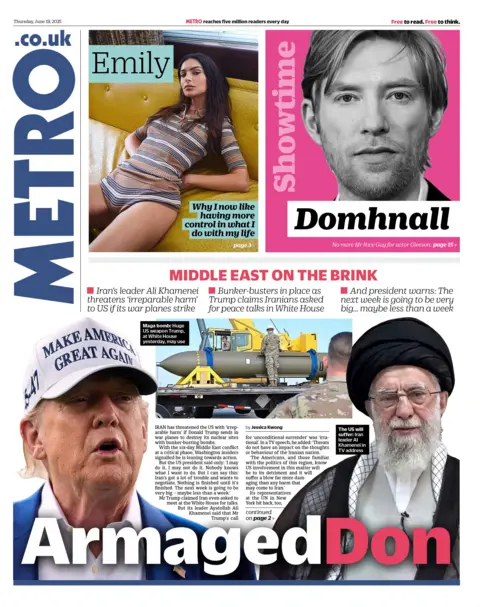The current geopolitical climate is undergoing intense scrutiny, driven primarily by the potential military actions of the United States towards Iran. This situation has captured the attention of the world and lit up headlines, with terms like “ArmagedDon” adorning the front pages of various newspapers, as seen in the Metro. The critical backdrop here is the growing tension between the United States and Iran, marked by threats of retaliatory actions from both sides. Iran has made it clear that it intends to inflict “irreparable harm” on the US should President Donald Trump proceed with orders to strike its nuclear facilities.
In the midst of these threatening atmospheres, Trump’s communications further stoke fears and concerns. In his statements, he warned that “next week is going to be very big – maybe less than a week,” hinting at possible escalation in conflicts that could necessitate military involvement. The Guardian’s take on the situation highlights Trump’s indecisiveness, stating he “keeps the world waiting” as he vagues about a potential US engagement in Israel’s anti-Iran campaign by saying, “I may do, I may not.” This ambiguity is primarily contributing to the heightened global anxieties surrounding the issue.
Furthermore, the Financial Times elaborates on the US’s strategic military capabilities. It notes that the United States possesses powerful missile systems designed for penetrating underground targets, which would be vital in mounting a successful attack on Iran’s nuclear sites. This information is not just noteworthy for its military implications; it underscores the US’s pivotal role in any prospective military actions against Iran, a role that the UK is closely monitoring.
Parallel discussions ensue regarding the UK’s potential involvement. Prime Minister has reportedly convened the Cobra crisis committee to deliberate whether to support the US militarily if it opts for a strike against Iran. This indicates not only the possible entanglement of Britain in a complex international conflict but also reflects the growing anxieties among UK citizens and politicians about such a scenario.
Legal and ethical considerations are starting to arise from this impending conflict. The Daily Telegraph brings to light cautions from Attorney General Lord Hermer that involvement in a US-led attack on Iran could bespeak illegality under international laws. Such sentiments echo the wider concerns of activists and legal experts about the ramifications of military interventions in foreign territories without sufficient legal frameworks or justification.
Lastly, this ongoing diplomatic strife is further characterized as a “war of words,” as the Sun described it, showcasing how the power of rhetoric plays into strategic considerations. While these declarations and counter-declarations are vivid in the media, they play a critical role in shaping public perception and international relations.
As the news cycle continues, other related topics emerge within various publications, such as defense spending within NATO, UK welfare expenditures, and the potential for legislative reforms regarding assisted dying—each topic discussed with various degrees of urgency and concern reflective of the current moment.
Evidently, the combination of these articles creates a vivid backdrop against which the US and UK grapple with their positions in international crises. The complexity of military strategies, potential legal ramifications, and ethical dilemmas encapsulate the intricate tapestry of modern geopolitics marked by the threats of nuclear engagement and the uncertain future of international relations. In this context, the world watches closely, anticipating its next moves and awaiting answers to pressing questions that loom large in the unfolding drama of global power dynamics.



